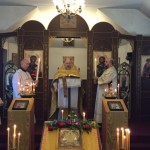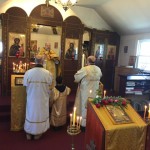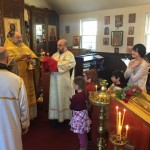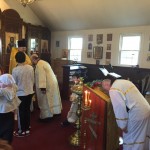On February 28, on the Sunday of the Prodigal Son, we had a nice celebration in our parish temple. Our Rector, Archpriest Igor Tarasov served the Divine Liturgy. Following the Gospel lesson he preached a homily in Russian. The English translation of that homily is as follows:
“On this Sunday the Church tells the parable of the Prodigal Son (Lk. 15, 11-32). It is a very profound and detailed instruction on repentance. Last Sunday we began to sing, “The doors of repentance open to me, o Giver of life”. It is important to remember about repentance these days. However, we may also reflect today upon some other idea of the today’s parable. It is about the Father who had two sons. Who is the Father and who are the two sons?”
”The Father represents God, the Father of all mankind. The elder son represents the Jewish people because alone of all people the Jewish people had kept the memory of God. They remained with the Father. They kept the memory of God having the Book describing God’s creation, the fall of mankind and telling that God will save His people, will send the Messiah.”
“On the other hand, the younger son represents the Gentiles, that is the pagan world. At the time of Christ, this meant the whole world except for the Jews. Unlike the Jews, the pagans had confused their memories of God the Creator with all sorts of false stories, myths and legends. They had confused the Creator with creation, and instead of worshipping God, they worshipped stones and rivers, the sun and the moon, kings and queens, thinking that they were gods and so making them into idols. The pagans, the younger son, had journeyed into “a far country” and there “wasted their possessions” (Lk. 15, 13). In other words, they distanced themselves from God, forgot His Truth, so wasting their spiritual inheritance. As a result, they suffered from “a severe famine”, in other words, from spiritual hunger, and so ate with “swine”, that is, ate with the illusions of the demons. However, they repented and turned back towards the Father, who welcomed them with open arms, running out towards them to embrace them.”
“This parable is in fact a warning to the Jews. We can see the Father showing love and forgiveness towards the repentant son, who lies at His feet, begging forgiveness. The elder son, however, is angry, full of bitterness and jealousy.”
“Perhaps we feel some sympathy with the elder son. After all, he never wasted his possessions, he did remain loyal to the Father. The problem is that the elder son’s service was a form of slavery; he did not stay with the Father out of love, but out of self-interest, in expectation of a reward. This was not love, but an obligation fulfilled in the hope of being paid. We can compare this with the attitude of the Father. He instantly forgives all that the younger son, the pagan world, has done and says: “Let us make merry” (Lk. 15, 23). The attitude of the Father is not gloom, but joy. The elder son, on the other hand, is full of gloom and cannot bring himself to be joyful or express love, because he has no love for his brother. The Father says: “All that I have is yours” (Lk. 15, 31), and shares everything. The elder son wishes to share nothing, for he is locked up in pride and self-love. Indeed, the elder son does not want to share in all that the Father has. Yes, he wants to share in His wealth and His property, but he does not want to share in what the Father has above all else – in His merciful compassion and love.”
“Thus, dear brothers and sisters, we are reminded of the words of the Apostle Paul, that though we may have all qualities, if we do not have love, then we are nothing (1 Cor. 13, 1-3). In this way, this parable has a meaning for us. We may have great wealth, wonderful gifts or talents, we may have a great profession, a nice house, but if we have no love, then all what we have is worthless and our lives themselves have no meaning. If there is no love, there is only the emptiness of vanity and the gloom of selfish pride.”
“Therefore, dear brothers and sisters, let us not imitate the elder son from today’s parable, but let us learn from the merciful Father. Let us too be merry, for God the Father Most Compassionate is waiting for us. Let us rejoice, for Jesus, the Lord of Love makes joy even out of the greatest sinner who repents. Let us be glad that all we prodigals are able to return to the Father and be embraced by His love!”
Before the Holy Communion the choir prayerfully sang the Psalm 136 (“Down the rivers of Babylon…”) which the Church begins to add to the services on this Sunday.
After the Liturgy dismissal the Rector preached a short sermon in English addressing the main ideas of his Russian homily.
Following the sermon the altar server Andrew Malyshew spoke and congratulated the Rector on his appointment as Dean of the Eastern States. The choir and congregation then proclaimed “Axios” (“Is worthy”) to Fr. Igor. In response to that the Rector expressed his gratitude to the parishioners and also his joy that they sang the Greek word “Axios” without any command, but as an expression of their feelings. Such was the attitude of the Christians in the early Church when that word was proclaimed by the congregation and defined whether a candidate is worthy to be ordained or to become a Church official. Fr. Igor said that he is glad that our Parish doing so resembles the early Christian community. He also asked the faithful to pray for him that the Lord may assist him to fulfill his new obedience which had been added to his duties as Rector of St. George Church.
Following the liturgical service the Rector and parishioners enjoyed delicious meals and a nice company during the coffee hour. Then Annual Parish Meeting had been held after the trapeza.




